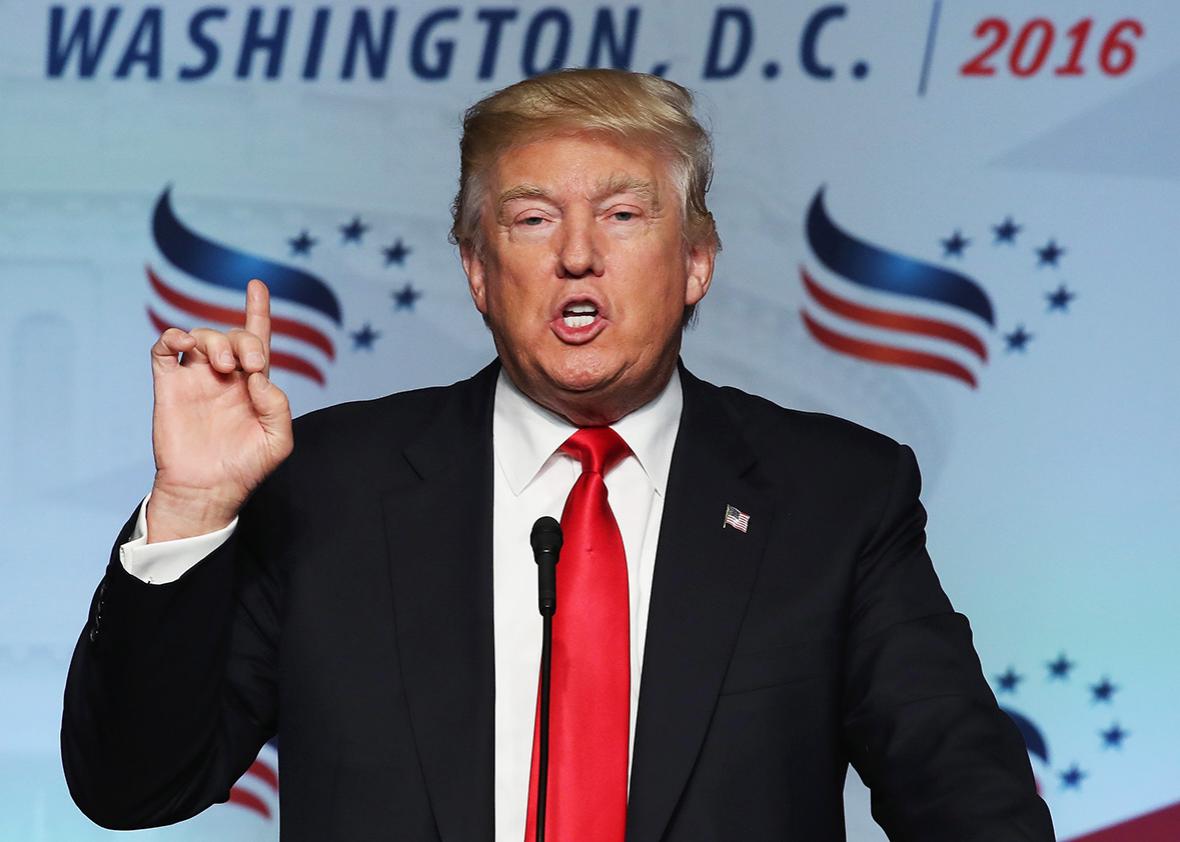On Friday afternoon, Donald Trump headlined the Road to Majority conference, the first big Republican event since he locked up the party’s nomination. Jointly organized by the Faith and Freedom Coalition (Ralph Reed’s successor to the Christian Coalition) and Concerned Women for America, the Road to Majority was meant to excite social conservatives for the upcoming election. It featured a lineup of big Republican names—Sen. Mitch McConnell, Carly Fiorina—and Christian-right activists, several of whom had previously worked to thwart Trump and who now had to fire up an audience for their perpetually off-message orange sybarite of a candidate. It was a degrading spectacle; I almost felt bad for them.
Reed made a theological case for low expectations. “Unlike a lot of our friends on the other side, we’re not looking for a political messiah, because we already have a messiah,” he said. “We understand that perfection is not the measure that should be applied. … Because in all of recorded history there has only been one perfect person, and he wasn’t a candidate, and he wasn’t a political figure. His name was Jesus Christ.”
Others avoided talking about Trump at all. Speaking before Trump, Fiorina denounced Hillary Clinton—“Mrs. Clinton, newsflash, I’m a feminist and I’m not voting for you”—but didn’t once mention the Republican candidate. She even seemed to subtly attack Trump and the Republicans who’d endorsed him. “How we win matters,” she said. “Our faith tells us that victory at all costs is no victory at all. Our faith tells us that the ends do not justify every means. It’s important for us to remember, as we wage this battle for the future of our nation, who are we. What do we stand for.” She also cited George Washington’s warnings about political parties engendering blind factionalism and referenced a friendly conversation she’d had with Rosie O’Donnell, one of Trump’s many nemeses. It was a bravura display of political passive-aggression.
Trump was supposed to speak right after, but he was late. To kill time, organizers repeated a trailer for Dinesh D’Souza’s forthcoming apocalyptic fantasia, Hillary’s America. They’d already shown it a few hours earlier; its farcical bombast, aimed at those who find Michael Bay films too restrained and artful, would have been a perfect introduction for the Republican nominee. But Trump still wasn’t there when the trailer had ended so Reed returned to the podium and filibustered about trans people in bathrooms, the Declaration of Independence, and learning as a child about the bravery of Cubans who fled Fidel Castro’s tyranny. Finally, he ran out of things to say and ducked offstage, saying, “Let me find out where Mr. Trump is.” A few minutes later, Trump arrived.
He took a sheaf of notes out of his jacket pocket and seemed to stick closely to them. His speech was a series of disconnected talking points; you could have cut up the sentences and rearranged them at random, and it wouldn’t have been any more or less coherent. Much of it was a characteristic appeal to white Christian identity politics. “We will restore respect for people of faith who dutifully raise their children, follow our laws and rules, and we have to really take care of them,” he said. Then, a few minutes later, “We will respect and defend Christian Americans. Christian Americans.”
His speech was interrupted four times by women, including Code Pink co-founder Medea Benjamin, who stood up shouting, “Stop Trump! Stop hate! Refugees are welcome here!” before being dragged away by security. A few in the crowd tried to start a chant of “Trump! Trump!” but it soon petered out. Then someone started shouting “USA! USA!” and many more joined in.
Which isn’t to say the audience wasn’t with Trump; there were plenty of applause lines. “I’m challenging Hillary Clinton today to replace her support for increased refugee admissions, we have to do it, for a new jobs program for our inner cities,” said Trump. “We have to take care of the people that are here.” The attendees loved it. Leave aside, for a moment, the foolish idea that admitting refugees and investing in jobs is a binary choice. The spectacle of self-proclaimed Christian conservatives cheering a foul-mouthed ex-casino owner for his pledge to turn away refugees tells you pretty much everything you need to know about what the religious right has become—or maybe what it always was.
